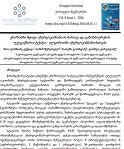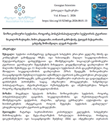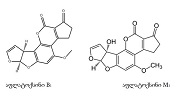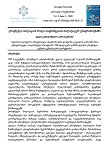Dynamics of immunocompetent cell distribution in duodenitis and celiac disease
Downloads
Celiac disease is an immune-mediated systemic disease caused by the ingestion of gluten and related prolamins in genetically sensitised individuals and characterised by various combinations of small intestinal lesions. Our study aimed to study the distribution of immunocompetent cells in celiac disease and other duodenitis. Within the framework of the study, a cohort retrograde study was carried out, for which archival material of the teaching-scientific and diagnostic laboratory of Tbilisi State Medical University for the years 2017-2024 was used. Based on the results of our study, the lymphoepithelial index may be used as a more accurate criterion of the degree of damage in celiac disease as well as a risk factor for progression, requiring more in-depth additional studies. AgNOR's additional staining method may assess the crypts' regeneration degree. Therefore, it can be used as an auxiliary criterion to evaluate the progression of celiac disease. In particular, assessing proliferative activity in the crypt epithelium, thus determining the degree of regeneration, maybe a more accurate marker of damage and progression. Digital assistants such as Qupath may be used to objectively assess the number of infiltrating lymphocytes and the degree of regeneration.
Downloads
G. Caio et al., “Celiac disease: a comprehensive current review.,” BMC Med, vol. 17, no. 1, p. 142, Jul. 2019, doi: 10.1186/s12916-019-1380-z.
U. Volta et al., “Minimal Lesions of the Small Intestinal Mucosa: More than Morphology.,” Dig Dis Sci, vol. 65, no. 10, pp. 2761–2768, Oct. 2020, doi: 10.1007/s10620-020-06571-1.
J. A. Tye-Din, H. J. Galipeau, and D. Agardh, “Celiac Disease: A Review of Current Concepts in Pathogenesis, Prevention, and Novel Therapies,” Front Pediatr, vol. 6, Nov. 2018, doi: 10.3389/fped.2018.00350.
S. Husby, J. A. Murray, and D. A. Katzka, “AGA Clinical Practice Update on Diagnosis and Monitoring of Celiac Disease-Changing Utility of Serology and Histologic Measures: Expert Review.,” Gastroenterology, vol. 156, no. 4, pp. 885–889, Mar. 2019, doi: 10.1053/j.gastro.2018.12.010.
K. Artykiewicz et al., “Celiac disease - a review on recent advances in characteristics, diagnostic and treatments,” Journal of Education, Health and Sport, vol. 13, no. 1, pp. 11–17, Nov. 2022, doi: 10.12775/JEHS.2023.13.01.001.
Y. Sahin, “Celiac disease in children: A review of the literature.,” World J Clin Pediatr, vol. 10, no. 4, pp. 53–71, Jul. 2021, doi: 10.5409/wjcp.v10.i4.53.
V. Villanacci et al., “Celiac disease: histology-differential diagnosis-complications. A practical approach.,” Pathologica, vol. 112, no. 3, pp. 186–196, Sep. 2020, doi: 10.32074/1591-951X-157.
R. Del Sordo et al., “Histological Features of Celiac-Disease-like Conditions Related to Immune Checkpoint Inhibitors Therapy: A Signal to Keep in Mind for Pathologists.,” Diagnostics (Basel), vol. 12, no. 2, Feb. 2022, doi: 10.3390/diagnostics12020395.
R. Celli et al., “Clinical Insignficance of Monoclonal T-Cell Populations and Duodenal Intraepithelial T-Cell Phenotypes in Celiac and Nonceliac Patients,” American Journal of Surgical Pathology, vol. 43, no. 2, pp. 151–160, Feb. 2019, doi: 10.1097/PAS.0000000000001172.
A. Kirmizi et al., “Discriminant value of IEL counts and distribution pattern through the spectrum of gluten sensitivity: a simple diagnostic approach.,” Virchows Arch, vol. 473, no. 5, pp. 551–558, Nov. 2018, doi: 10.1007/s00428-018-2430-1.
Copyright (c) 2024 Georgian Scientists

This work is licensed under a Creative Commons Attribution-NonCommercial-NoDerivatives 4.0 International License.


























































































































































































































